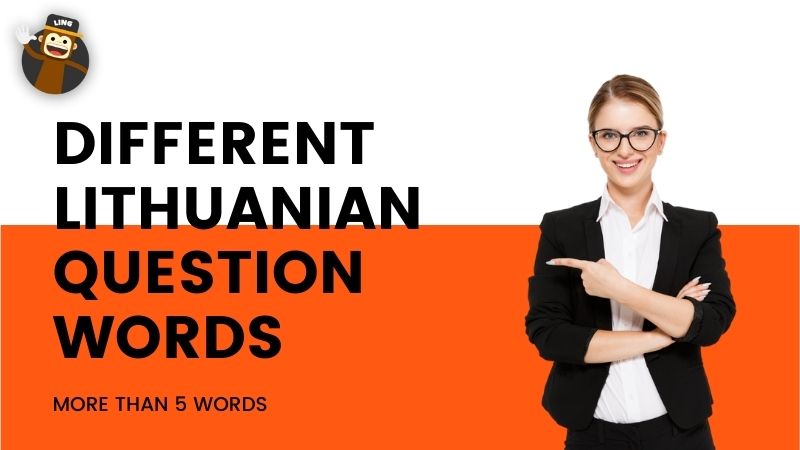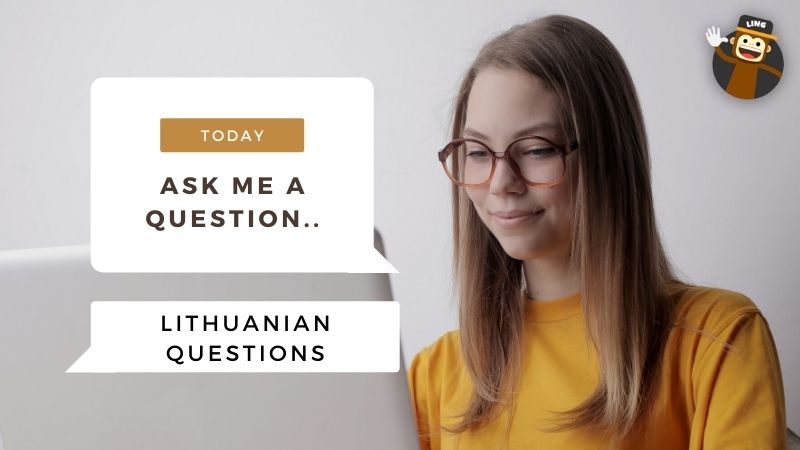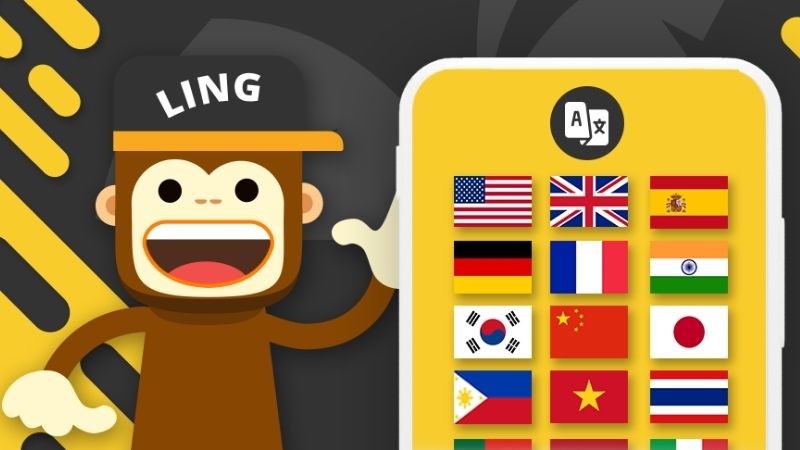We always ask questions, from who, when, to what, where. And if you are traveling to Lithuania soon, these question words will pop up in your head no matter what. However, you might confuse the locals with your English vocabulary without knowing the same in the Lithuanian language.
Thus, to make your trip to Lithuanian a relaxing one, this blog has prepared a beginner lesson on Lithuanian grammar with a basic understanding of different types of questions in Lithuanian to help improve your Lithuanian vocabulary. So, if you are eager, learn Lithuanian grammar with us and enlarge your language skills to impress the locals and have a fun time. Let’s get started!
The Status Of The Lithuanian Language
Before entering the grammar world, let’s get acquainted with the Lithuanian language. Lithuanian is the official language of the region of Lithuania, shared by almost 2.8 million people and 200,000 speakers beyond its borders.
It is a member of the Baltic language family and is very close to Latvian. Although similar to the Latvian language, Lithuanian is one of the more comprehensive languages influenced by archaic features from the Proto-Indo-European language.
Looking at such a nature of the Lithuanian language, it may look a bit baffling for people who speak English, especially keeping in mind the declension of the literature. The 32-letter Latin alphabet system, forms for dual numbers in verbs and nouns, etc., also take up a lot of time to learn in the beginning stage.
However, if you are of Latvian or Russian origin, it can become easier to learn Lithuanian. Even if not, understanding the question words is the first step to acquiring the true Lithuanian spirit for any new learner. So, let’s learn Lithuanian and engage with the beauty of the learning journey!
Different Types Of Questions In Lithuanian
The question words such as what, where, when, why, etc., are an essential Lithuanian vocabulary you should learn before beginning your trip. No matter what, there will always be circumstances where you would have to interact with locals to inquire about something or ask for help. Thus, to avoid checking YouTube or google for translations repeatedly, adding native words to your Lithuanian vocabulary beforehand will ensure a more easy-going and relaxing trip.
This section will also cover some examples to help form clear sentences and questions and the question words.
1. Ką
Ką is the literal translation of the word “What.” You can use this to form questions like “What is that?” and “What are you doing?” It is one of the most critical question words of the language that you will constantly require once you are in Lithuania. As a new visitor to the country, almost everything will seem out of the world, and Ką can help you receive data by asking the locals. You can also use Kas as the nominative case of the same word “what” in Lithuanian.
Examples
| English Translation | Lithuanian |
| What are you doing? | Ką tu darai? |
| What is that? | Kas tai? |
| What’s your name? | Koks jūsų vardas? |
| What did you say? | Ką tu pasakei? |
| Sorry, what? | Atsiprašau ką? |
2. Kodėl
Kodėl is the Lithuanian word for “Why.” As the word gives a sign itself, Kodėl is used when you ask about the reasons for some particular event or action. Such as “Why is it here?” or “Why did you go?” It will help you gain data more precisely when asked to native speakers.
Example Phrases
| English Translation | Lithuanian |
| Why is this here? | Kodėl čia taip? |
| Why did you leave? | Kodėl išėjote? |
| Why are you laughing? | Kodėl tu juokiesi? |
| Why not? | Kodėl gi ne? |
| Why me? | Kodėl aš? |
3. Kaip
Kaip means “How” in English, and you can use this to ask common questions such as “How much?” and “How are you?”
Visiting a new country means a lot of shopping. And “How much does it cost” while a shopping spree becomes a common phrase that you will here in every person’s mouth. So, Kaip can come in handy in a lot of situations.
Examples
| English Translation | Lithuanian |
| How much does it cost? | Kiek tai kainuoja? |
| How are you? | Kaip laikaisi? |
| How is the food here? | Kaip čia maistas? |
| How long will it take? | Kiek tai užtruks? |
| How old are you? | Kiek tau metų? |
4. Kas
Kas is the question word for “Who.” You can use kas when you are trying to inquire about a subject. It can be a person or any living being. It helps you with questions like “Who are you” or “Who is this?”.
Example Phrases
| English Translation | Lithuanian |
| Who (What) is it? | Kas tai? |
| Who are you? | Kas tu esi? |
| Who did this? | Kas tai padarė? |
| Who is that girl? | Kas yra ta mergina? |
| Who is he? | Kas jis? |
5. Kada
Kada is the word for “When.” Use Kada when you have a question relating to time, something that relates to “at that time.” You can use this for question phrases such as “When was this?” or “When did you come?” and spam the natives until you get an answer!
Example Sentences
| English Translation | Lithuanian |
| Where are you from? | Iš kur tu esi? |
| Where do you get quality food? | Kur gauni kokybiško maisto? |
| Where is this? | Kur tai yra? |
| Where are you now? | Kur tu dabar esi? |
| Where will you stay? | Kur apsistosite? |
Basic Lithuanian Grammar For Questions
The words like Kur, Kada, Kas, etc., are some basic question words you will require in any question phrase you form in Lithuanian. However, let’s not limit our Lithuanian skills at this point. To help make more sense and give you more insight into Lithuanian language questions, we have gathered some extra phrases to teach you a few common questions and inquiries.
| English | Lithuanian |
| Do you know me? | Ar jūs mane pažįstate? |
| Where is your hometown? | Kur yra tavo gimtasis miestas? |
| Do you speak Polish? | Ar tu kalbi lenkiškai? |
| What is your hobby? | Koks tavo hobis? |
| Where are your parents? | Kur yra tavo tėvai? |
| Why are you silent? | Kodėl tu tyli? |
| What is wrong? | Kas blogai? |
| What is the next course of action? | Koks tolesnis veiksmas? |
| When are you getting married? | Kada tuokiasi? |
| Who are your parents? | Kas yra tavo tėvai? |
Master Lithuanian With Ling
If you enjoy this joyous ride towards learning new languages, it is a sign that you should not stop yet! Reach out to Ling App to watch and learn quality language content with videos and audio recordings with proper Lithuanian vocabulary pronunciations.
Apart from grammar, like noun concepts, plural-singular numbers, or alphabets, you will also learn about unique topics such as 20+ Lithuanian Food Ingredients: The Best List! and #1 Best Guide To Lithuanian Culture.
Unlike other spam websites, Ling has authentic resources to help you inherit unharmed knowledge. To put it simply, the Ling App is not just your regular app. It is a language learning powerhouse that has tons of high-quality lessons, resources, and blogs with the help of language experts from all over the world.
They can give you a proper language learning journey at zero cost. So, what are you waiting for? Just download it to your device and learn Lithuanian without wasting your time!

















